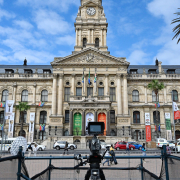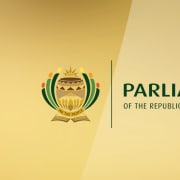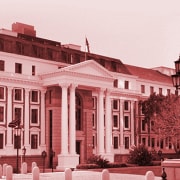|
Getting your Trinity Audio player ready...
|
The Parliamentary Monitoring Group (PMG) published its 2023 review of Parliament in December of that year. The review included discussion of a March motion of no confidence against National Assembly (NA) Speaker Nosiviwe Mapisa-Nqakula, the cabinet reshuffle in the same month, the removal of the former public protector Busisiwe Mkhwebane, and internal disciplinary matters, among others.
The review also discussed the work done by members of Parliament (MPs) in committee meetings, the legislation considered and passed in 2023, and Parliament’s work in implementing the recommendations of the Zondo commission which pertained to its own functioning.
With Parliament due to open again next week, it is worth looking back on some of the key events of last year’s legislative proceedings.
Committee work
There were 90 plenary days on Parliament’s calendar last year, several of which included debates to not only coincide with commemorations such as Women’s Day, Youth Day, Africa Day, and the 16 Days of Activism Against Gender-Based Violence, but also to promote discourse in general.
In terms of committees, the review noted that 1 284 committee meetings took place in 2023. Of these meetings, ministers and their deputies attended some 607, or 47%. “This was a slight improvement from 2022 when they attended 606 (44%) meetings.”
The review explained that MPs spend most of their time in committees, even though the public focus is more on the main chambers of the NA and the National Council of Provinces (NCOP). “The substantive work – lawmaking, oversight, and budgetary allocation – occurs in committees.”
With 67 meetings, the Portfolio Committee on Justice and Correctional Services was the busiest of the NA committees, followed by the Standing Committee on Finance with 54 meetings. On the NCOP side, the busiest was the Select Committee on Security and Justice, which held 27 meetings. This was followed by the select committees on Trade and Industry, Economic Development, Small Business, Tourism, and Employment and Labour, with 23 meetings apiece.
Meanwhile, the NA’s Standing Committee on Public Accounts (Scopa) met 47 times throughout the year. Its main agenda item was the investigation into allegations of financial impropriety and the misuse of public funds at Eskom, Denel, South African Airways, and other entities. One of its high-profile matters involved several meetings into the allegations of corruption made by Andre de Ruyter against Eskom executives and ANC members during a March 2023 interview in eNCA.
De Ruyter, politicians including public enterprises minister Pravin Gordhan, presidential security advisor Sydney Mufamadi, police commissioner Fannie Masemola, and deputy police minister Cassel Mathale, as well as Special Investigating Unit (SIU) head Andy Mothibi, all appeared before Scopa at various times during the weeks after the televised interview, while the committee investigated the allegations.
Besides its legislative commitments, the busiest committee – Justice and Correctional Services – was tasked with processing Judicial Service Commission reports which found the retired Judge Nkola Motata and suspended Western Cape Judge President John Hlophe guilty of gross misconduct. In a meeting on 22 November, the committee resolved by majority to recommend to the NA that the two judges be removed from office – this recommendation must be supported by a two-thirds majority, or 267 of 400 MPs, to take effect.
The NA deferred the voting on this matter to January 2024, said the review, due to Parliament’s tight schedule and lack of a suitable venue.
Also of note was the work done by the Ad Hoc Joint Committee on Flood Disaster Relief and Recovery into making findings and recommendations in response to devastating floods in the Eastern Cape, Free State, Gauteng, KwaZulu-Natal, Limpopo, Mpumalanga, and the North West in February 2023. President Cyril Ramaphosa declared a national state of disaster on 13 February.
Legislation
In the area of legislation, another of Corruption Watch’s work focus areas especially in terms of corruption, it was an important year.
For the first time since 2012, Parliament amended the Constitution, to include South African sign language as a 12th official language. This followed the introduction of the Sign Language Bill to Parliament in January 2023. The bill aimed to give people who are deaf or hearing-impaired, equal protection before the law, and it was unanimously adopted on 2 May. Ramaphosa signed the bill into law in July 2023, bringing to 12 the number of official languages in the country.
The bill is one of 43 that were introduced in 2023. Currently there are over 50 bills before the NA and the NCOP – some of these are the Judicial Matters Amendment Bill, the Public Procurement Bill, the Public Service Commission Bill, the General Intelligence Laws Amendment Bill, and the Companies Amendment Bill.
The Public Procurement Bill was tabled in Parliament in June 2023. Civil society is not convinced that the bill addresses its primary goal, which is to create a unified procurement framework across state entities by establishing a Public Procurement Office in the Treasury and setting transparency standards, among other measures. The bill contains numerous gaps, say organisations, which must be addressed.
But bills must be dealt with in a timely fashion, the report notes, especially towards the end of a five-year administration – otherwise they will lapse and can only be revived in the following administration. There was therefore pressure to process and rush through bills currently before the legislature. However, part of the end-of term rush was caused by the failure of the Executive to submit bills on time for Parliament to process them, a situation that “repeatedly came up during committee meetings. Members lamented the perennial delays in bringing far-reaching bills to Parliament with Constitutional Court deadlines looming”.
For other legislative highlights, read the parliamentary review.
Zondo commission
Chief Justice Raymond Zondo delivered the final report of the state capture commission on 22 June – the report comprised six parts, with 17 sub-sections. The Presidency issued a 77-page response, outlining the steps the various arms of government would take to address the recommendations Zondo made.
The PMG has published two reviews of Parliament’s work in processing and implementing the Zondo recommendations – one in August 2022 and the other in August 2023.
“Parliament began formally and substantially processing the Zondo Commission Report in November [2022] when the NA Rules Committee convened and adopted a 31-page Implementation Plan to deal with the Commission’s recommendations. Since then there have been ongoing and regular developments which PMG keeps track of.”
In June 2023 Mapisa-Nqakula presented a progress report on Parliament’s implementation of the Zondo recommendations.
Restoration of Parliament
The PMG review addressed the ongoing repairs to the NA chamber, which was damaged in a fire in January 2022. As a result, parliamentary proceedings have had to take place outside the parliamentary precinct, and meetings and sittings were often held in a hybrid environment.
Meanwhile, Mapisa-Nqakula directed parliamentary staff to find a venue to be used temporarily for physical sittings until the fire-damaged chamber is repaired and has given them until the end of the financial year, March 2024, to do so.
“From 1 April we should operate in a physical form. We need to find a venue, it does not matter where we find it,” she said.








